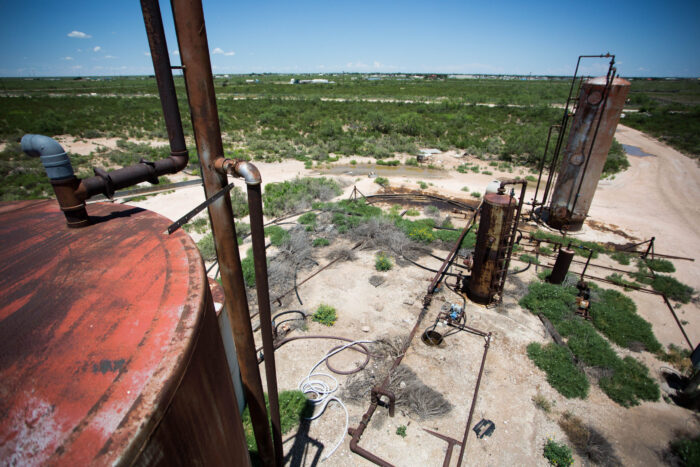Texas began its 89th legislative session on Jan. 14. As activities at the capitol ramp up, here is a beginner’s guide to the Railroad Commission of Texas and this session’s need-to-knows.

Despite their name, they do not control any of the railroads in the state — that responsibility belongs to the Texas Department of Transportation.
The Railroad Commission of Texas (RRC) actually oversees “the oil and natural gas industry, pipeline transporters, natural gas and hazardous liquid pipeline industry, natural gas utilities, the LP-gas industry, critical natural gas infrastructure, and coal and uranium surface mining operations,” the commission self-reports. In layman’s terms, they control oil and gas development, gas utility services, and coal and uranium mining in Texas.
The RRC has three commissioners elected to six-year terms every two years: Chairman Christi Craddick, Commissioner Wayne Christian, Commissioner Jim Wright. This means no commissioners will be up for re-election at the same time — the vacancies will always be staggered. One of the three commissioners also serves as the commission’s chairperson.
Texas accounted for 43% of “U.S. crude oil and 29% of U.S. natural gas marketed production,” according to the Texas Oil and Gas Association. “As a direct correlation, the state also emits mass amounts of pollution.” Inside Climate News reported in 2023 that there were 9,614,351 gallons of produced water, a toxic pollutant, spilled from oil and gas wells. As these spills occurred, they went underreported for several years because the Railroad Commission never formally adopted guidelines for addressing produced water spills. This is just one example of how the commission impacts the health and safety of Texans. However, this is not just a state issue. The Texas oil and gas industry is a major global player in the energy sector and has an impact on world-wide climate change. Therefore, the commissioners are far more powerful and influential than most Texans realize.
Bills can be filed and passed in the legislative session that require the Railroad Commission to amend their policies. For example, a house bill from the 87th legislative session, HB3516, called for the commission to “encourage the commercial recycling of liquid oil and gas wastes,” according to their Legislative Appropriations Request released in August 2024. As a result of that House bill, the commission issued a framework for pilot programs to work on how to recycle produced water safely and economically.
The legislative session is a crucial time to educate legislative offices and influence bills that directly impact the Railroad Commission’s policies and operations.
Additionally, the Railroad Commission and all Texas state agencies are subject to review by the Texas Sunset Advisory Commission every 12 years to evaluate their operations. The Railroad Commission will be up for Sunset again in 2029. Read the full report from 2016-17 here.

The Texas legislative session meets for 140 days every two years. Legislators are divided up into two sectors: the House of Representatives (150 members) and the Senate (31 members). Every legislator works to the benefit of their constituents — you can find out who represents you here.
The biggest priority for every legislative session is the state budget — it is the only bill out of thousands that might get filed that must be passed before the session ends in May. The three most expensive articles are agencies of education; health and human services; and business and economic development, which includes the Texas Workforce Commission, Texas Lottery Commission, and the Texas Department of Transportation. More information can be found in the Fiscal Size-Up 2024-25 Biennium report here.
All bills for the regular session must be filed by the 60th day of the session, which this year falls on March 15, 2025, and they typically follow a formulaic life cycle. Bills are introduced by a legislator either in the Senate or the House and are then given an identifying number: SBX or HBX, depending on which chamber they were filed in. The numbered bills then go to a committee made up of legislators who will consider bills with a hearing and then decide whether to vote them out of committee. The Chairman of the Committee determines which bills will get a hearing, and will call for votes on the bills. Members of the public have the best opportunity to be influential at this point in the process by encouraging the committee chairman to hold hearings for bills, testifying in support of bills, and encouraging committee members to vote to support a bill. Conversely, a member of the public can also oppose bills at the committee level. Many bills never make it out of committee — they may be amended or even withdrawn. If a bill does make it out of committee and on the chamber’s calendar, the public can also be helpful at this point by encouraging or discouraging voting for the bill. And if the bill passes one chamber, it must go through the process again in the other chamber. A flowchart of each step can be found here.
 Governor Greg Abbott: He was elected in 2014 and began his first term as governor in January 2015. The governor has to approve and sign each bill before it can go into effect. He also has the power to veto any bill except for a constitutional amendment, declare emergency items (priority issues), appoint agency heads, and use the bully pulpit — a fancy way of saying he can talk about any issue with authority, because he is in a prominent position of power.
Governor Greg Abbott: He was elected in 2014 and began his first term as governor in January 2015. The governor has to approve and sign each bill before it can go into effect. He also has the power to veto any bill except for a constitutional amendment, declare emergency items (priority issues), appoint agency heads, and use the bully pulpit — a fancy way of saying he can talk about any issue with authority, because he is in a prominent position of power.
Aside from the normal session, the governor also has the power to call a “special session,” used to address any issues that weren’t adequately addressed during the regular session. This is very loose terminology and largely up to the discretion of the governor in office. Abbott called four special sessions in the 88th Legislative Session, with a prominent focus on school vouchers and funding for private and religious schools.
 Lieutenant Governor Dan Patrick: Like Abbott, he was also elected in 2014 and began his first term in office in January 2015. He presides over the Senate and has the authority to appoint all committee members and chairpersons, controls the schedule for what bills are heard when, and decides what will be seen by the full Senate.
Lieutenant Governor Dan Patrick: Like Abbott, he was also elected in 2014 and began his first term in office in January 2015. He presides over the Senate and has the authority to appoint all committee members and chairpersons, controls the schedule for what bills are heard when, and decides what will be seen by the full Senate.
 Speaker of the House Dustin Burrows: He has served as the State Representative for District 83 since 2014 and was elected by the members of the House of Representatives to be the Speaker of the House in January 2025. He presides over the House and, similarly to Patrick for the Senate, he appoints all committees and chairpersons.
Speaker of the House Dustin Burrows: He has served as the State Representative for District 83 since 2014 and was elected by the members of the House of Representatives to be the Speaker of the House in January 2025. He presides over the House and, similarly to Patrick for the Senate, he appoints all committees and chairpersons.
Since legislators have until the 60th day of the session to file a bill, lawmakers, organizations, and constituents alike are taking this time to establish their priorities. Patrick announced his top 25 priority bills for the session on the morning of Jan. 29. At number seven, right below “Increasing Texas’ Electric Grid Reliability,” he wrote “Increasing Investments in Texas’ Water Supply.”
The Alliance for a Clean Texas had their first-ever legislative briefing on Jan. 29. Fourteen organizations aimed at fostering a cleaner energy future in Texas, including Commission Shift, met to present their priorities for the 89th Session. They presented to an audience of representative staff members to educate staffers about the issues

Commission Shift Action’s top legislative priority this year is promoting responsible plugging practices for orphaned wells in Texas. Inactive orphaned wells are oil, gas, or injection wells that still have active operators and have not been active in the last 12 months.
In the 2025 State of the State address on Feb. 2, Abbott released his priorities, labeled “emergency items.” These items included water infrastructure expansion.
The press release states that water is an issue that affects “every family and every business.” “Last session, we invested $1 billion in water projects and infrastructure. This session, we will Texas-size that investment.”
Protecting clean water resources in Texas is at the heart of our well plugging regulation priorities. Inactive and unplugged wells threaten the safety of ground and surface water. For more information, read our Orphaned Oil and Gas Well report.
“It is vital that the legislature changes state laws to ensure that active operators pay to plug their own wells in a timely manner before the wells end up orphaned,” Commission Shift executive director Virginia Palacios said in the Railroad Commission of Texas Open Meeting on Jan. 29.
There are currently 150,000 inactive wells in Texas. — 8,500 of those are orphaned, meaning there is no viable responsible party or the known owner is bankrupt, and all are unplugged. There is not enough state or federal funding for the commission to plug each well. At the current rate, it would take approximately 20 years to plug every inactive well.
“Limiting the number of inactive well plugging extensions an operator can get for a well would be a simple and reasonable way to ensure wells are plugged before they are orphaned and before they cause pollution to groundwater,” Palacios said.
Commission Shift Action is also advocating for a new name for the Railroad Commission that accurately reflects the responsibilities and role of the state agency, so that the people of Texas know its true purpose.
Commission Shift Action will be keeping a close eye on the Capitol this Legislative Session. As legislative activities continue, we’ll keep providing explainers, updates, and engagement opportunities for supporting helpful bills and opposing harmful ones.
“Constituents talking to their representatives and senators really does matter,” Palacios said.
Join us on February 26th and 27th for our Capitol Visit to speak to your representatives about cleaning up orphaned and inactive wells and strengthening carbon capture and storage protections during the 2025 Texas Legislative Session. RSVP for the event here.

Orphan well, carbon capture regulations top energy reform group’s legislative wish list